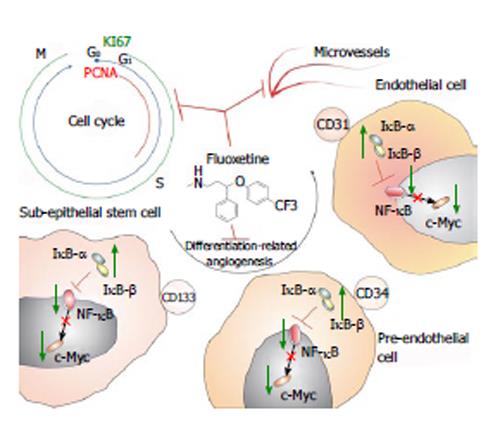Copyright
©2014 Baishideng Publishing Group Co.
World J Gastrointest Oncol. Jan 15, 2014; 6(1): 11-21
Published online Jan 15, 2014. doi: 10.4251/wjgo.v6.i1.11
Published online Jan 15, 2014. doi: 10.4251/wjgo.v6.i1.11
Figure 4 Schematic illustration shows fluoxetine anti-angiogenic potential in colon preneoplastic tissue.
This means that by reducing proliferation of subepithelial cells, blocking their cell-cycle, fluoxetine would reduce microvessel density. This anti-angiogenic potential was observed in a direct relationship with reduced differentiation-related angiogenesis of subepithelial stem cells. This suggests that fluoxetine would reduce the differentiation of CD133 positive cells into a CD34 phenotype, which would also not differentiate in endothelial cells, as CD31. This sequence of events would mainly be associated with the control of fluoxetine treatment on nuclear factor kappa-B signaling, as reducing proliferation and preneoplastic angiogenesis. PCNA: Proliferating cell nuclear antigen.
- Citation: Stopper H, Garcia SB, Waaga-Gasser AM, Kannen V. Antidepressant fluoxetine and its potential against colon tumors. World J Gastrointest Oncol 2014; 6(1): 11-21
- URL: https://www.wjgnet.com/1948-5204/full/v6/i1/11.htm
- DOI: https://dx.doi.org/10.4251/wjgo.v6.i1.11









